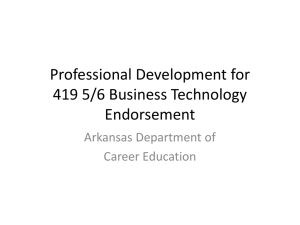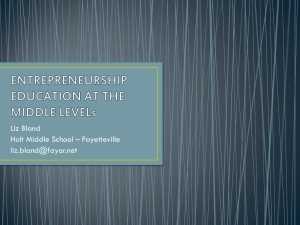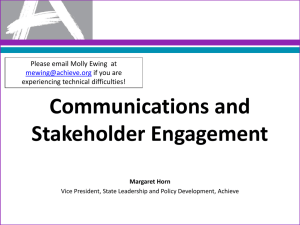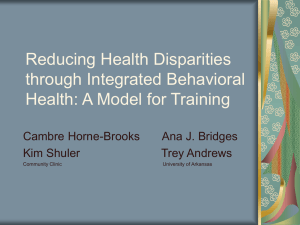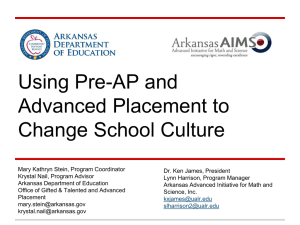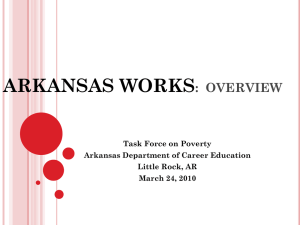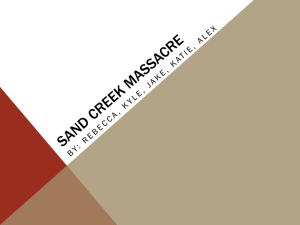CT/CO Pilot () - Arkansas Business Education Association
advertisement
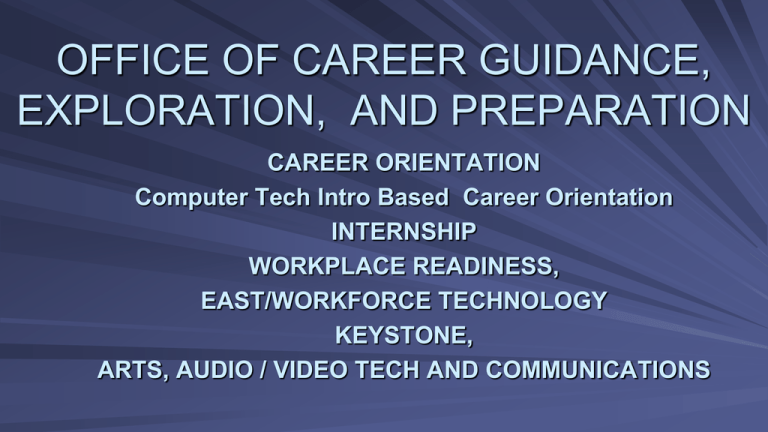
OFFICE OF CAREER GUIDANCE, EXPLORATION, AND PREPARATION CAREER ORIENTATION Computer Tech Intro Based Career Orientation INTERNSHIP WORKPLACE READINESS, EAST/WORKFORCE TECHNOLOGY KEYSTONE, ARTS, AUDIO / VIDEO TECH AND COMMUNICATIONS Introduction to Career Guidance Ray Henson, Program Manager Barbara Lensing, Program Advisor Dave Fisher, Program Advisor Dede Crowder, Secretary ◦ ◦ ◦ ◦ raymond.henson@arkansas.gov david.fisher@arkansas.gov barbara.lensing@arkansas.gov dede.crowder@arkansas.gov CONTACT INFORMATION E-mail – raymond.henson@arkansas.gov Address # Three Capitol Mall Luther Hardin Building, Suite 408 Little Rock, AR 72201 phone: (501) 682-1616 fax: (501) 682-8306 Arkansas Department of Career Education – http://ace.arkansas.gov ACE INFORMATION Department of Career Education http://ace.arkansas.gov Secondary Career & Technical Education – – – – – Program Policies Perkins IV Information Registration Information and Forms for In-service Report Forms Important Links Career Guidance, Exploration, and Preparation (under Operational Guides) Course Information, Technology Standards, Minimum Equipment Legislation - HB 730 The Arkansas College and Career Readiness Planning Program requires “consistent precollege readiness assessments to increase successful student transitions into postsecondary education” And, Measure student readiness for future learning without remediation to improve college and workforce readiness Improving College and Career Readiness Indicators • Improve graduation rates • Increase nontraditional placement • Raise college entrance rates • Improve positive postsecondary placement • Increase program of study completers • Improve parental involvement • Improve level of student satisfaction with education School Requirements Each career focus program of study shall consist of foundation courses in grades 7 or 8: Career Orientation, Computer Technology Intro or alternate Computer Business Applications and Keyboarding. A minimum of three (3) Carnegie units in grades 9-12, a career focus is required for a program of study in career and technical education. Approved programs must offer a complete program of study on a two year rotational basis. Core courses must be offered annually. 399100 Career Orientation Credit: Grade Levels: 7-8 (8th grade recommended) Career Orientation is a foundation course for all Career & Technical Education programs of study. It must be offered to all students at the seventh or eighth grade level for a minimum of one semester. Career Orientation is an exploratory hands-on activity based class in which students explore the world of work in relation to their interests, life and work values, aptitudes, personality and lifestyle through selfdiscovery. This class emphasizes self-evaluation, decision-making, college and career research, employability skills and career portfolio development 399280 CT Intro Based Career Orientation Career Development (2013) Credit: Grade Levels: 7-8 This is an alternate course to combine Career Orientation and Computer Technology. This course will allow schools to meet the requirements for introducing students to hardware and application software of a computer with applications in career planning, preparation, exploration and development. Students will be knowledgeable about the world of work, career options, and the personal skills, aptitudes, and expectations to complete the education and training requirements to enter into a future career. Satisfies Computer Tech Intro and Career Orientation course requirements Must be taught in a Business Lab Instructor must have: – 224 Business Technology with 411 CO Endorsement or – 225 Business Technology with 411 CO Endorsement Career Development Standards Knowledge Based Standards State laws and policies regarding career development Objectives of Career Guidance, Exploration and Preparation Frameworks and curriculum to prepare instructional materials and lesson plans Teacher requirements, school expectations, and student performance Competencies required for a professional career development instructor/facilitator Career Development Philosophy Career development is the foundation that encompasses the skills and knowledge necessary to be successful in any selected career pathway and program of study regardless of postsecondary plans. Career development is prerequisite in nature and fundamental for all subsequent career planning and preparation. The theory is to plan for something with a career focus and prepare for everything with a well rounded education. COURSE EMPHASIS Self-awareness in relation to the student’s interests, values, attitude, personality, and desired lifestyle. Occupational and educational terminology Career research using every resource and opportunity available Decision-making, goal setting, and career planning Employability skills Education and training requirements Introduction of the 16 career clusters Developing Employability and transferable skills Career “Development” Career development is the sequence of career related choices and transitions over a span of time. It includes awareness of self and the world of work, and planning, preparation and pursuance of a satisfying and fulfilling career. The process begins early in life and may continue throughout a lifetime. Guidance, facilitation and coaching are essential to help an individual transition through education, job preparation and career changes. Curriculum Teachers must follow the framework, but the curriculum can be developed according to regional workforce needs, teacher knowledge and skills, district programs of study, school facilities and equipment, and student interests. Career Development is student centered, project based career planning Computer Tech Intro Based C/O • Instructor must hold a: Business License 224 or 225 and Career Orientation 411 • Class must be taught in a computer lab to meet Business requirements Career Orientation Endorsement Policies Endorsement - completion of the following courses or the mentorship training program is required for Career Orientation endorsement and must be completed prior to teaching Career Orientation a second year: a. Three semester hours of "Methods of Teaching Career Orientation". b. Three semester hours of "Hands-on Activities for Career Orientation". – (2013 will change to Methods only) OR Complete an equivalent mentorship training program designed and approved by ACE under an approved model trainer. Attend the Career Guidance New Teacher Endorsement Workshop provided by ACE. July 10 -12 or Sept 11 – 13. APPROVAL PROCEDURE ADE Application Application sent to ACE for Career Orientation endorsement. Application must include: – – – – Teacher name, SS#, & contact information School information Demographic information Application Type Adding Additional Licensure Licensure Code 411 Grade Levels (7-8) – Original transcript with endorsement classes or recommendation from Mentor ENDORSEMENT PROCEDURE Mail the application to the Dept of Career Education Office of Career Guidance, Exploration & Preparation – (if you received endorsement training for C/O with coursework a transcript must be sent) After review, approval will be forwarded to ADE to be added to your license. We will mail a copy of our endorsement letter to you and your school. Teacher Information System http://ACE.ARKANSAS.GOV Create New Account by Sept 10 each year Generic Login Name: CTE Generic Password: Teacher Create Account with personal information CTE class schedule with course codes for each semester Subscribe to the CEP Listserv http://arcota.org – http://list.state.ar.us/mailman/listinfo/cep Click on CEP Listserv Complete: Name, E-mail address & Password Click “SUBSCRIBE” Confirm subscription by re-”SEND”ing e-mail Equipment Business Lab (2012-2013) Internet connected computers are available for student use A lockable file cabinet is available for confidential student records Presentation equipment is readily available Digital camera is available An up-to-date inventory is kept in the classroom Long range plans (3 to 5 years) for equipment replacement Program Facilities and Equipment The classroom provides an environment that promotes learning through the use of visuals and the display of student work The classroom is conducive to learning, clean, neatly organized, and well maintained The teacher has an Internet connected computer and printer for classroom and instructional management. Students have sufficient access to computers for research with a printer The classroom is of sufficient size to conduct individual, group, and hands-on activities. Adequate storage is available for materials and supplies to conduct hands-on activities. CGEP Expectations Join the Arkansas Career Guidance Association (ACGA) Attend the Career Guidance Conference and New Teacher Inservice Communication CEP Listserv Use the ARCOTA.ORG website for activities Submit student contest entries annually Prepare for Technical Assistance Visits Career Planning Upon completion of the eighth grade, each student shall have a four-year plan, which includes courses to be taken on file. The career plan is then revisited each year for any necessary adjustments. It is recommended that career plans include a minimum of two (2) years of post secondary education. Instructional Curriculum and Assessment Curriculum must be aligned with frameworks Lessons must be aligned to an overall cohesive and coherent plan Activities should be aligned to student interests and community/regional needs Career planning should be aligned to the district programs of study Career Development Standards Self-awareness – Develop honest awareness of self and personal preference for the purpose of self-promotion, advocacy and management necessary for Locate Career Information – Analyze occupational and career resources necessary to digest current, accurate, and unbiased information Career Decision-making – Formulate career decisions based upon a decision-making process necessary for choosing a career High School and Career Planning – Develop tentative high school and career plans with a logical sequence of courses and achievable steps Career Readiness – Assess and explain fundamental career readiness skills which form the basis for further career preparation. Facilitate Learning Allow the student to fail at what they don’t have the aptitude for and excel at what they are naturally good at. Career Development Theory – People are rewarded for success and gravitate toward reward – People find a niche for their aptitude and develop a pathway of learning toward a career Model Career Guidance Programs • High expectations for all students • Allow each student to focus their studies in their career path • Make the instruction relevant to the student from the first day of instruction to the last day • Make the instruction rigorous and challenging • Develop project based, team oriented, technology centered curriculum Promote Education and Training “Beyond High School” College (4-year degrees) is not the answer for every student even with the lottery scholarship money available What does the student’s Career Goal require? Promote the easiest route to success (obtaining the career goal) (Further education can come later) Students will take the path of least resistance or they may drop out. Assessments Comprehend and use both formal and informal career development assessment tools and resources Interest Inventories Aptitude Assessments Work Values Assessments Personality Typing Attitude Assessment Brain Orientation Self Esteem Activities Values Auction Job Shadowing, Skits, Bell Ringers Calculating Opportunity Cost – Math integration Creating a Newscast – Literacy integration Plans of study – Sample Plans – Plans beyond high school Developing a Career Pathway Do not confine a student to an occupational goal Do encourage students to think globally within a career pathway with multiple entry and exit points to allow for barriers and opportunities. When students have a career plan they… Make better grades Have more college and career information Believe their school has a positive climate Feel middle school is safer Have a better relationship with their teachers Are more satisfied with their education – Results from Lapan, Gysbers, and Sun concluded students in Missouri: Career Development is progressive in nature and does not take a step backward Do not confine your students to your own learning, for they were born in another time. Hebrew proverb Assessing The Whole Person Changes in Workforce Skills Needs Across Fifty Years Skilled 20% Unskilled 60% Professional 20% 1955 Unskilled 12% Professional 20% Skilled 68% 2005 Applied Skills expected to increase in importance 1 Critical Thinking/Problem Solving 2 Information Technology Application 3 Teamwork/Collaboration 4 Creativity/Innovation 5 Diversity 6 Leadership 7 Oral Communications 8 Professionalism/Work Ethic 9 Ethics/Social Responsibility 10 Written Communications Relevancy Projects that allow for self-discovery, selfexpression, self-promotion and creation Allow independent and individualized career development planning Student centered interests, values, aptitudes, research, and aspirations Transferable 21st Century skills Challenge Students Students like to be challenged to prove their worthiness to themselves and others. Students need to solve real world problems Students want to know what they are doing is important and not filling time Students really like to tell their parents that they have done something unusual, interesting, challenging, and fun. Rigorous Teaching Practices Create lesson plans using multiple learning styles Challenge students to excel on projects Require critical thinking skills Encourage students to go above and beyond the call of duty Incorporate math and literacy integration activities Program Resources Textbooks are for use as an instructional resource, not the primary instructional curriculum Assortment of self-awareness assessments and research programs provided at no cost such as Kuder Navigator, O*Net, Career One Stop, Discover Arkansas, Occupational Outlook Handbook, and ArkOscar. Career publications such as Arkansas NEXT, Career Watch, Future Focus and American Careers Current career and employability video collections arcota.org The “unofficial” site for Career Guidance Teachers maintained by Sharla Hartzell at Dover Middle School Includes: frameworks, resources, links, curriculum material and activities, examples, conference and workshop information, and much. Created by teachers for teachers ARCOTA Designed for Career Guidance Teachers http://arcota.org Conference Information ACGA and Student contest information Course information w/unit activities aligned with the frameworks Math & literacy prompts and activities Cluster activities, skits, and bell ringers Teaching resources Important relevant links CEP Listserv subscription link Utilize the Internet ARCOTA http://arcota.org Kuder Navigator http://arworks.arkansas.gov ArkOscar http://www.ioscar.org CAREER ONE STOP http://acinet.org Occupational Outlook Handbook http://www.bls.gov/oco Discover Arkansas http://discoverarkansas.net O*Net http://onetcenter.org 4-H Connection http://www.kidsarus.com Career Clusters http://careerclusters.org Real Life Arkansas http://real-life.arkansas.gov Bureau of Labor Statistics http://www.bls.gov Arkansas Kuder Navigator System in the Arkansas Works Initiative http://arworks.arkansas.gov Career Development Portfolio Career Development Portfolio (electronic) Career Focus/Program of Study Inventories/Self-Assessments High School Education Plan of Study Resume with Honors/Achievements/Activities Education and Employment History
